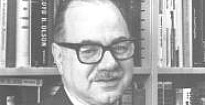Read: Weiss on Daniel Bell
 Michael Weiss writes:
Michael Weiss writes:
The death of sociologist Daniel Bell was remarkable for several reasons, the first being that there is no such thing as a New York intellectual anymore, the second being that his concept of the post-ideological age -- to which Francis Fuyukama’s more journalistic ode to the “end of history” is badly indebted -- was birthed at the threshold of a new age of ideology: the sixties. And Bell himself was nothing if not a reconstructed thinker in every way, with a bit of Trotsky, a bit of Kropotkin, and heaping dollops of Mills and Weber tossed into the mix.
Also, he was quite funny. Morris Dickstein (all right, there are still some New York intellectuals about) remembers Bell’s fondness for Yiddishkeit humor which is less an art form than a social science, depending more on the weight of human experience that goes into it than on the joke’s intrinsic wit. Having never met Bell in person, I have to rely on documentary evidence for his proficiency here.
In Arguing the World, the short film made about the combative geniuses of City College’s Alcove 1, Bell is shown returning to anarchic, honking Manhattan after decades spent among the dreaming spires of Harvard. Instantly we’re back in turn-of-the-century Russia being told of a former emigre’s similar experience upon returning home. The emigre puts down his bags at the train station and exclaims, “Oh Russia, how you’ve changed!” He looks down and sees that his bags have been stolen. “Oh Russia, how you haven’t changed!” You didn’t have to be there.
How often it was said of Bell’s generation that the political arguments fought and won in the cafeterias and on the soapboxes of "Moscow on the Hudson" were exactly the kinds of arguments that ought to have been had in Moscow -- were it not for the gulag and the firing squad. As for the uneasy exchange between a striving immigrant class of Eastern European Jews and their assimilated yet radical issue, Bell was similarly memorable:
[He] liked to tell of his political beginnings with an anecdote about his bar mitzvah, in 1932. “I said to the Rabbi: ‘I’ve found the truth. I don’t believe in God. I’m joining the Young People’s Socialist League.’ So he looked at me and said, ‘Kid, you don’t believe in God. Tell me, do you think God cares?’ ”
I can't help but feel that the roles in this exchange would be reversed today...

